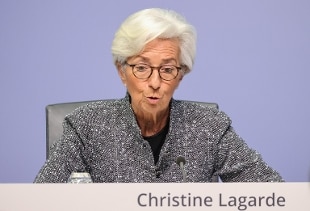ECB, Lagarde: "Key challenge to ferry the economy to the spread of vaccines"
ECB leaves interest rates unchanged.
Downside risks, we will evaluate pandemic trends
Share
November 12, 2020The Eurozone economy "loses momentum" and will suffer a "sharp decline in GDP in the fourth quarter", due to the new lockdowns and the severe impact of the pandemic.
This is what emerges from the latest ECB monthly bulletin, in which the central bank announces that in December it will "recalibrate its tools" to respond "to the changing situation and to ensure that financing conditions remain favorable to support the recovery. economic and counteract the negative impact of the pandemic on the forecast inflation profile ".
Furthermore, in the first half of the year, the Covid-19 epidemic caused "the most marked contraction ever recorded in employment and the total number of hours worked".
"In a longer-term perspective - reads the report of the Frankfurt institute - the possibility of a sustained recovery will continue to depend, to a large extent, on the evolution of the pandemic and on the success of the containment policies".
The uncertainty about the evolution of the pandemic, explains the Eurotower, will mainly affect the services sector and "is likely to mitigate the strength of the recovery of the labor market as well as consumption and investment, however the euro area economy should continue to be supported by favorable financing conditions, by the expansionary orientation of budget policies and by the gradual strengthening of activity and demand on a global level ".
As regards inflation, the central bank expects that prices will remain negative "until the beginning of 2021", while in the medium term "a recovery in demand supported by accommodative monetary and fiscal policies will exert upward pressure on inflation".
In the longer term, however, the expectation is that prices will remain "broadly unchanged at low levels".
"In the current context in which the risks are clearly oriented downwards - concludes the ECB in its monthly report - the Governing Council will carefully evaluate the most recent information, including the dynamics of the pandemic, the prospects for the release of a vaccine and the 'trend of the exchange rate "and will proceed to an overall recalibration of its instruments and in particular of the Pepp, the pandemic Qe and the Tltro, the targeted long-term refinancing operations of European banks.
Precisely with regard to the behavior of banks, the ECB notes in the bulletin that "in the third quarter of this year, banks tightened their criteria for granting loans to businesses and households due to an increase in perceived risk".
In short, as Christine Lagarde pointed out yesterday, the central bank is ready to lead the European economy "by compensating for the production gaps until vaccines are well developed and the recovery can gain momentum", a task not easy since, even if Pfizer's latest vaccine news "seems encouraging, we may still face recurring cycles of accelerating viral spread and tightening restrictions until widespread immunity is achieved."
And therefore, Lagarde warns, the "recovery may not be linear, but rather unstable".

